
TYPICA After Hours Talk with 3-Star Roaster Raw Sugar Roast: Coffee as a medium
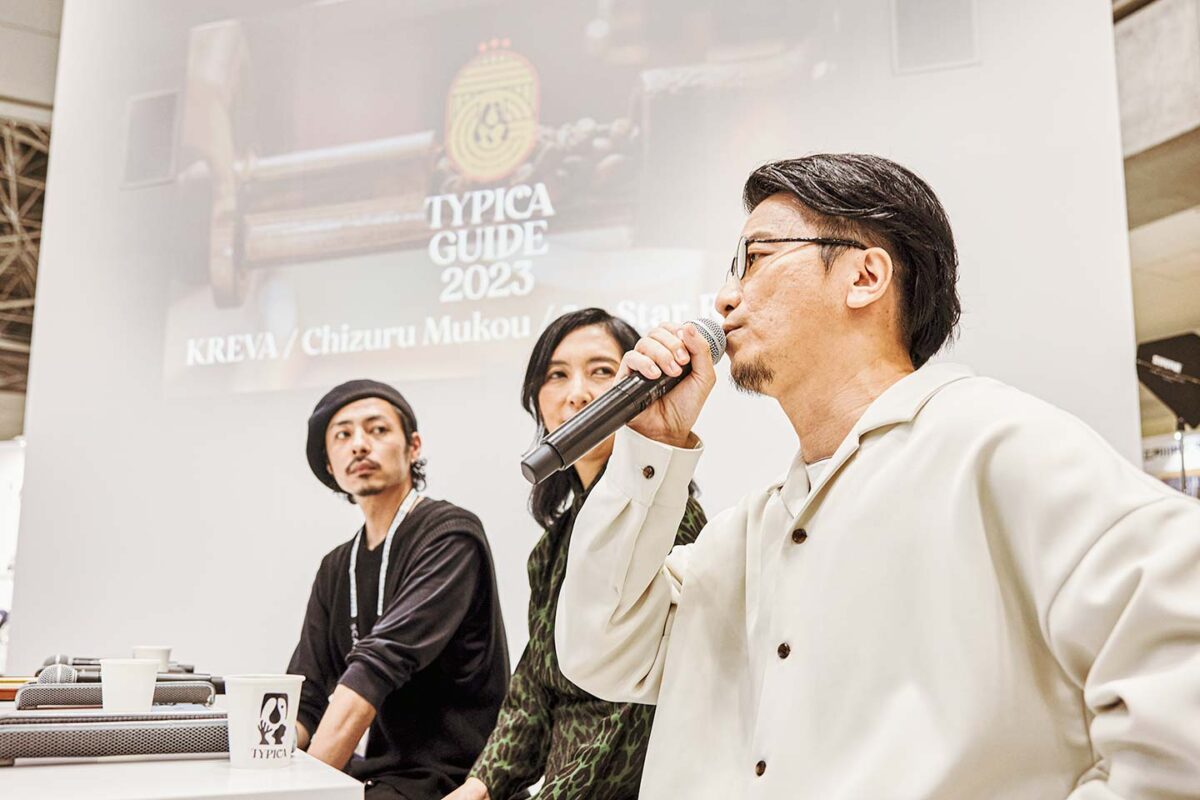
On October 13, 2022, day four of SCAJ 2022, TYPICA hosted the final round for the TYPICA GUIDE on the SCAJ Stage at Tokyo Big Sight. In this event, seven 2-Star Roasters representing different regions gave a presentation and brewing session, and a panel of judges and the audience voted on the best roaster. The top prize of 3-Star Roaster went to Yuya Kosakada from the Tokyo-based Raw Sugar Roast, and he was joined by judges KREVA and Chizuru Muko for a talk session at the TYPICA booth.
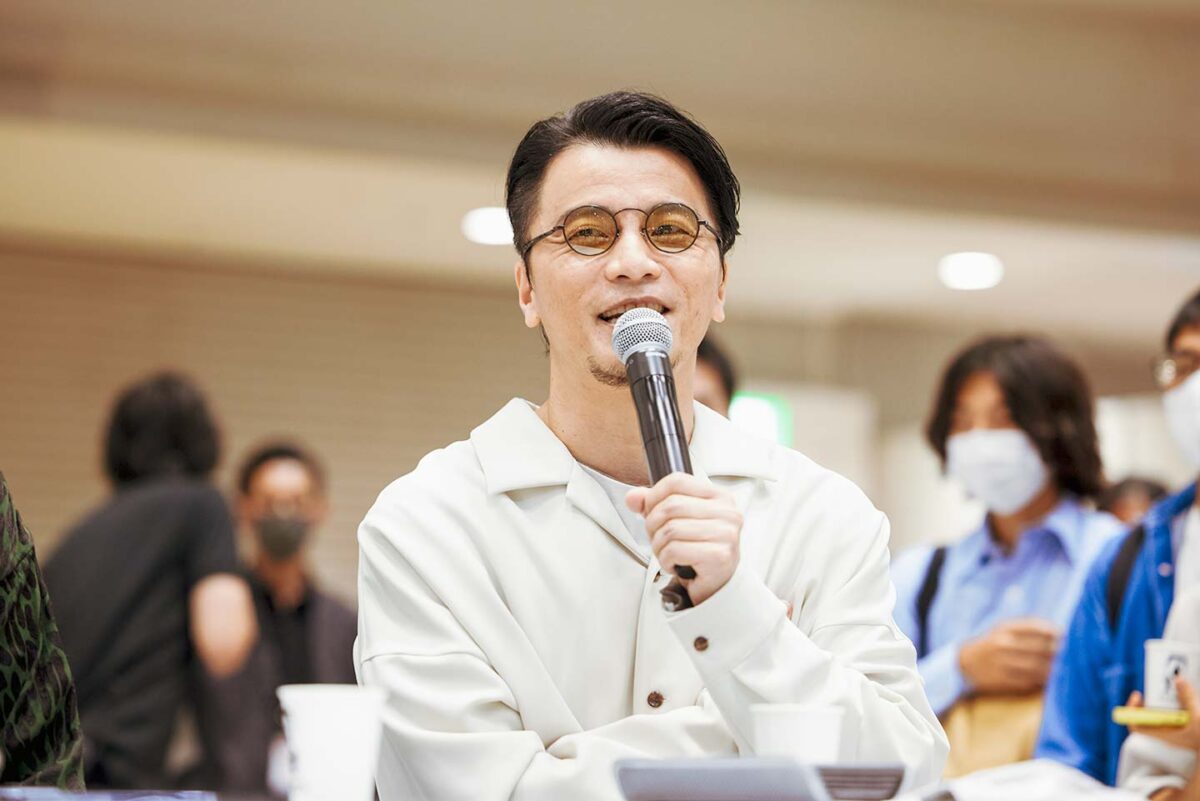
Telling the story from the beginning
Masashi Goto (Masashi): Thanks for coming and hope you all enjoyed the show. I’d like to start by asking the judges what they thought of Yuya’s performance. KREVA?
KREVA: Congrats, Yuya, great show. You know, I bet everyone out there is jealous because only we got to drink the coffee. But yeah, it was hard to choose a winner because all the presentations were amazing.
What set Yuya apart was how he described the flavors. With coffee, fruit is the go-to for flavor profiles. Apricot, grapefruit, any kind of citrus fruit.
But for me, a delicious coffee has undertones of dashi used in Japanese food. Wine too. So when he said “this coffee has notes of tomato,” I was like, yeah, that’s it. It stood out for me as a unique way to express the profile.
Masashi: Thanks for that, KREVA. Next, I’d like to ask Chizuru Muko from WWDJAPAN. What did you think, Chizuru?
Chizuru Muko (Chizuru): When Yuya first came on stage and asked for the music to be restarted, I knew that this presentation was going to be memorable. As he spoke, I could feel the atmosphere building and the audience being pulled into his story like some powerful, magnetic force. Just listening to Yuya, I could sense the passion the producers have for their coffee, even though I’ve never met them. And that’s what did it for me.
Masashi: Well, Yuya, how was it from your side?
Yuya Kosakada (Yuya): The presentation went really well, and it’s great to know that people could understand the flavors from that – which is what you want to happen as a roaster. As I said during the presentation, the story didn’t begin with me, it starts back on the farm. It’s my job to tell that story and being able to share that last chapter of coffee in a cup, here in front of everyone, was such an honor.
Masashi: So KREVA, I know you’re busy and you have to leave us now. Thanks so much for taking the time to join us today – any last words before you go?
KREVA: Something that struck me as a theme running through all the presentations today is this human-to-human connection. As a musician, my music has the potential to reach billions of people at once. But with coffee, you’re making one cup for one person at a time. And knowing that, I’m going to appreciate each cup of coffee even more. Thanks for that.
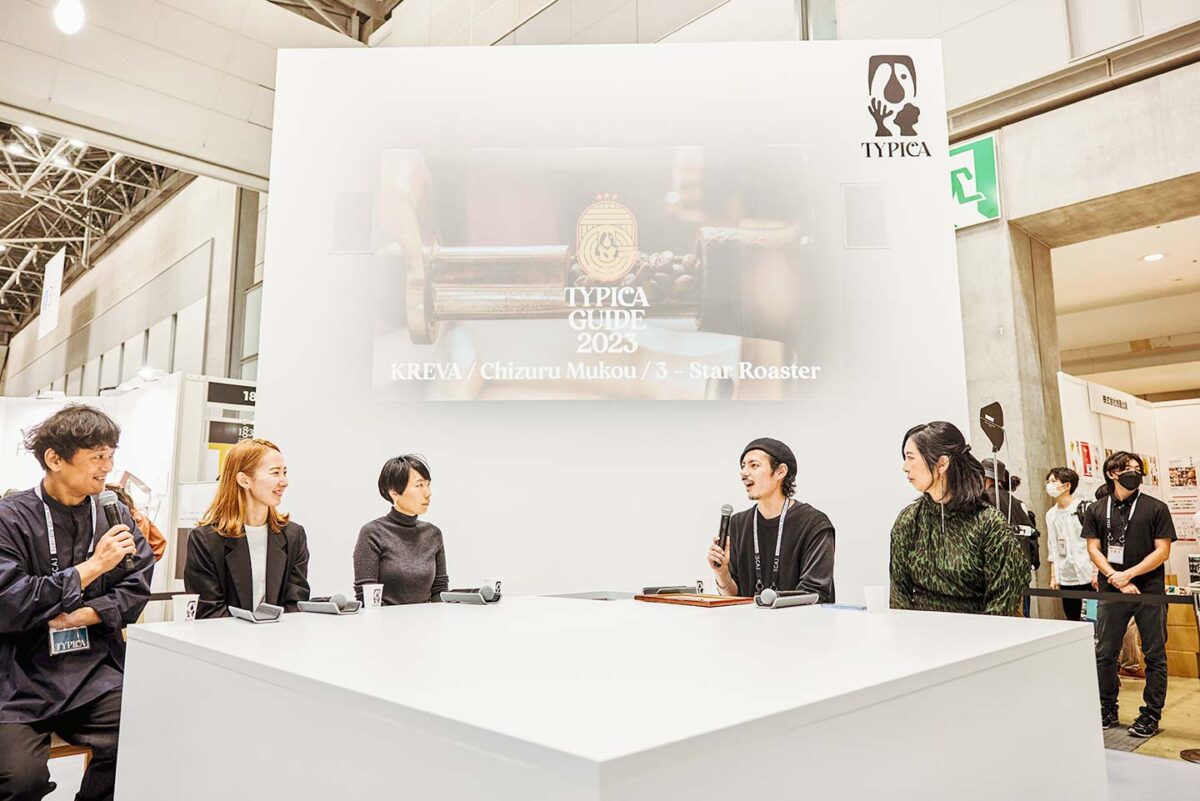
Masashi: Thank you, KREVA. Next up, Ayane Yamada from TYPICA. What did you think of the competition, Ayane?
Ayane Yamada (Ayane): Great presentation, Yuya. You came out on stage and it was like watching a rockstar, such incredible stage presence! Roasters and baristas are always looking for ways to get the feelings of the producers across, or to convey how good the flavor is. Your presentation was so beautifully done, so mesmerizing, that we couldn’t look away, we wanted to listen to what you had to say. And that’s why you did such a great job of getting your message across.
At the same time, hearing you talk so passionately about the producers, about Rockbern and your philosophy, showed this human side to you which was different to the star on stage. I think that contrast is what really won us over and I hope to see more of it in the future.
Masashi: So, let’s talk about the actual presentation. Yuya, as Chizuru mentioned, when you came on the stage, you asked for the music to be restarted. What happened there?
Yuya: So the song for my stage entry was by Muddy Waters, one of my favorite artists, and there’s a point at the beginning where the whole band comes in together. I want my presentation to be a performance, to be entertaining, and I wanted to time my entrance with that exact point in the song. But I was so nervous. I forgot everything I’d planned to say. My hands were shaking, I was holding the kettle in both hands instead of one. I was all over the place.
Masashi: You didn’t look nervous to us.
Yuya: Yeah, I was trying to act cool. When I heard “one minute left” I knew I wouldn’t be able to say all I wanted, and I’d forgotten it anyway. I purposely left my notes off stage because I didn’t want to be looking down all the time. In the end, I just winged it, putting everything into that final minute and somehow I managed to say all I wanted.
Masashi: And the fact that you won goes to show how much you succeeded in doing just that.
Yuya: I hope so.

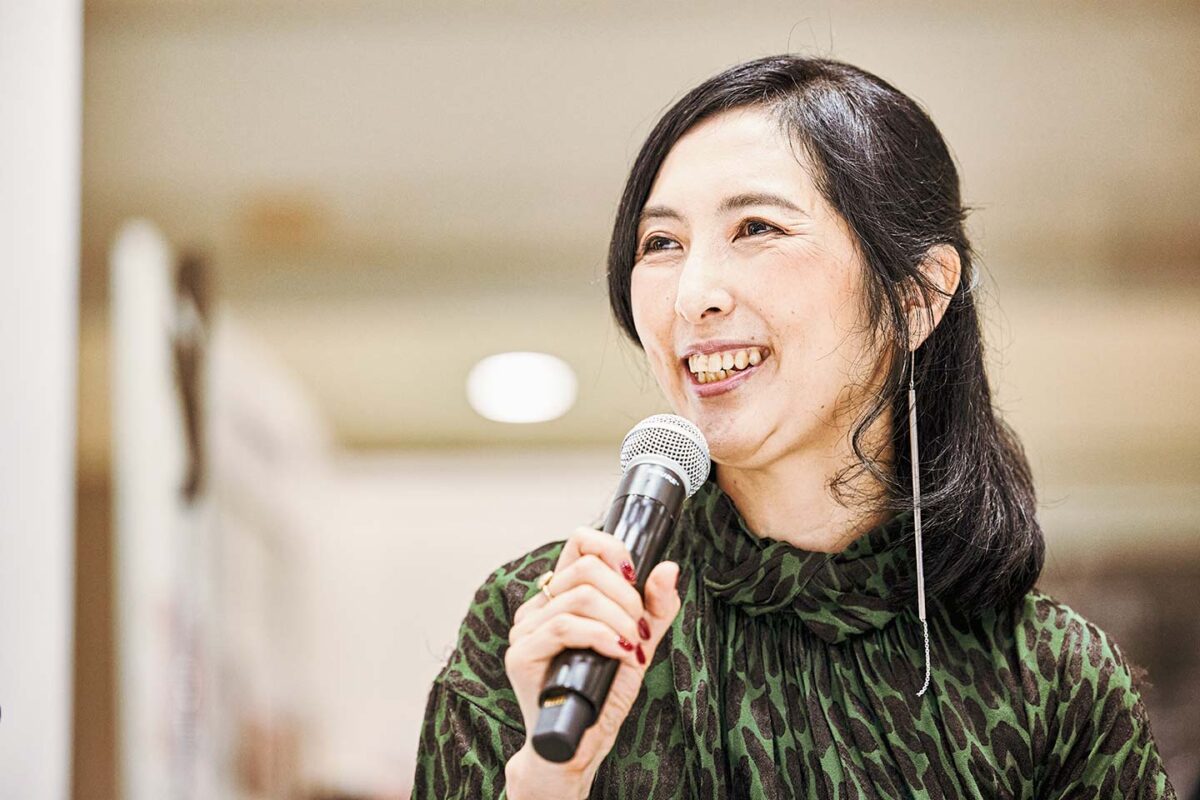
Cultivating a coffee culture
Masashi: So Chizuru, I’d like to ask you about your experience today. TYPICA is a community nurtured by all those who love coffee, and you and all the judges have been chosen because of their passion for coffee and their connection to TYPICA – which for you is a mutual friend. So, how has this been for you today?
Chizuru: At first, it felt like everything was new, but speaking to the people from TYPICA, I realized that there is a lot in common with the fashion industry. And one of the biggest similarities was how we think of culture. Culture comes from the word cultivate, as in cultivating the earth to make it more fertile. During the show, I realized that each cup of coffee was a way to share the culture of the people involved in producing it – even though none of them were present. It’s the same in fashion. When I wear an item I feel like I’m sharing the culture of the designer. It was an exciting epiphany for me.
Masashi: Thank you for that perspective, Chizuru. As a judge, you also watched recorded presentations, and I think you were doing that while also covering fashion week? How was that?
Chizuru: Well, there’s actually a lot of similarity between what I would look for in the fashion show and in the presentations. At a fashion show, I’m trying to see what the creators’ roots are, what they hold important, what they want for the future. And it was the same for the recorded presentations.
So I would take it in turns, go to a fashion show, watch a presentation, then watch a show, and so on. When I watched Yuya’s, I had this strong sense of his Japanese roots. He was like a samurai cutting a path through the era. Then today, when he spoke about producers being comrades in a revolution, I couldn’t help but think of Che Guevara.
Masashi: It must have been hard doing that during one of your busiest times of the year. Yet, I heard that you also wrote a comment to each of the roasters whose recording you viewed. Is that right?
Chizuru: Yes, I did. Actually, one of the applicants runs a coffee shop in my neighborhood. I had to forget the flavor so I could focus on their presentation – which was really good. In fact all the presentations were amazing. Even though I’d never met any of them, I could feel their passion and their intent. So I wanted to let them know what I thought. It felt like the right thing to do.
Masashi: Going back to what you said about culture being an important element in coffee and fashion, it’s especially significant in the world of specialty coffee, where we’re cultivating the market to grow better in the future. What message would you give to roasters and people in the industry?
Chizuru: Right now, sustainability in the fashion industry is something I’m covering a lot, and this drive for more transparency, showing who is making what and why, is exactly the same as what you’re doing with specialty coffee. But with TYPICA, you’re going one step further, looking for transparency in technology, in quality, in all areas of the process. And that’s something that really resonates with me.
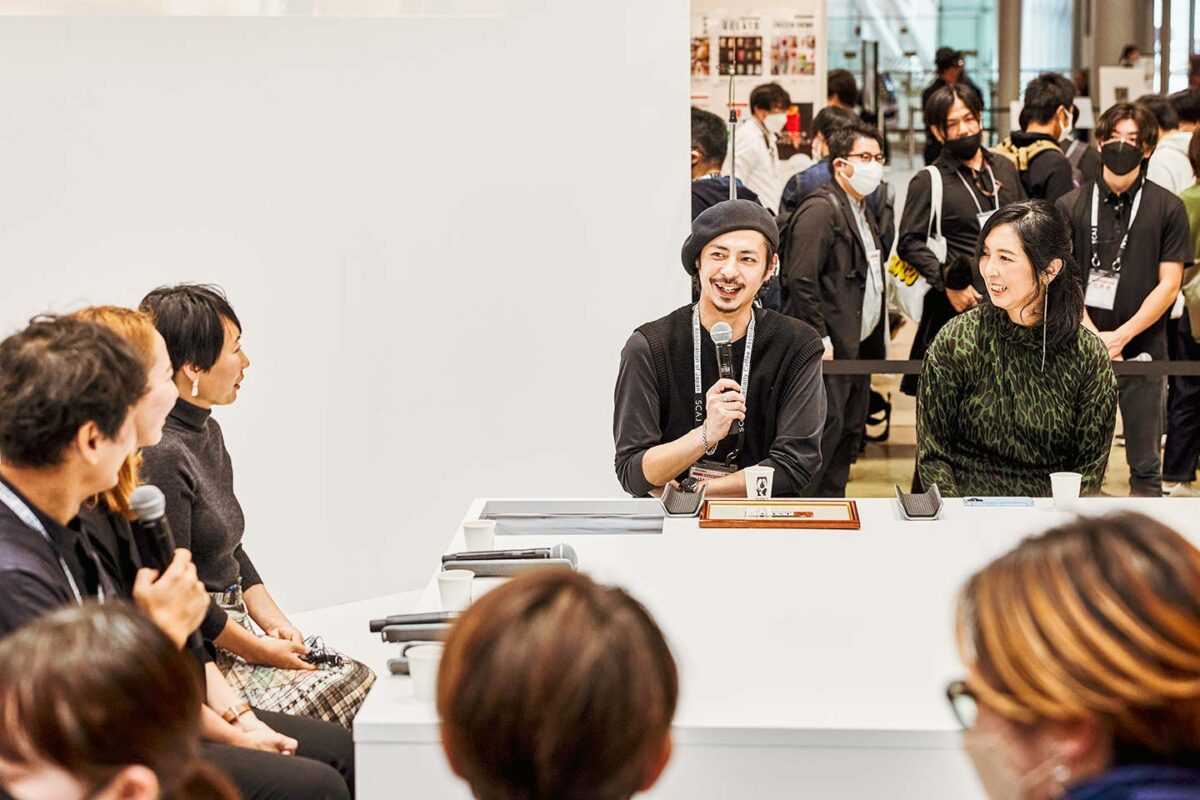
Masashi: Thank you, Chizuru. Yuya, you’re not the only competition winner at Raw Sugar Roast, right? A few days ago one of the baristas took the top prize at the AeroPress competition. With these industry-recognized successes, how do you see the role of the roastery in cultivating the future for specialty coffee?
Yuya: We’ve had a lot of attention since one of our baristas became the Japan champion for AeroPress and the shop has been super busy. But I try not to let it go to my head.
Our role is to make people’s lives better with coffee. In practical terms, that means educating the consumer on what specialty coffee is, and how it’s different. Roasters and baristas have a responsibility to communicate this, to be the storyteller, to make sure that the average coffee drinker knows more, and understands more.
Thanks to TYPICA, the message is getting out there, and I see my role as elevating coffee culture by amplifying the voice of coffee producers, and making sure more consumers know more about coffee.
Masashi: It’s inspiring listening to you, I can feel the passion you have for what you do.
Chizuru: You’re a natural, a star.
Yuya: Nah, it’s just the voice.
Masashi: Can you teach me?
Yuya: Sorry, you gotta be born with it, haha.
Chizuru: I have a question for Yuya. How did you feel doing the presentation in front of Peter, who supplies your beans? What was going through your mind?
Yuya: Well, I wanted to show him that it’s not something I take for granted. In roasting or in conveying the flavor, I respect the beans and am full of gratitude for his work. As our curator, he selects the coffee beans in Nyeri, Kenya, and sends them to us in Japan. So it was important that I got that across.
Chizuru: It was an amazing moment. Seeing the two of you here, in Tokyo, face-to-face.
Yuya: It was a first for me.
Masashi: How about in fashion? Does the designer ever get to meet the cotton producer?
Chizuru: Never! “Here’s the outfit I made with your cotton. What do you think?” Just imaging it makes me nervous! So yes, it’s an incredible opportunity, I think.

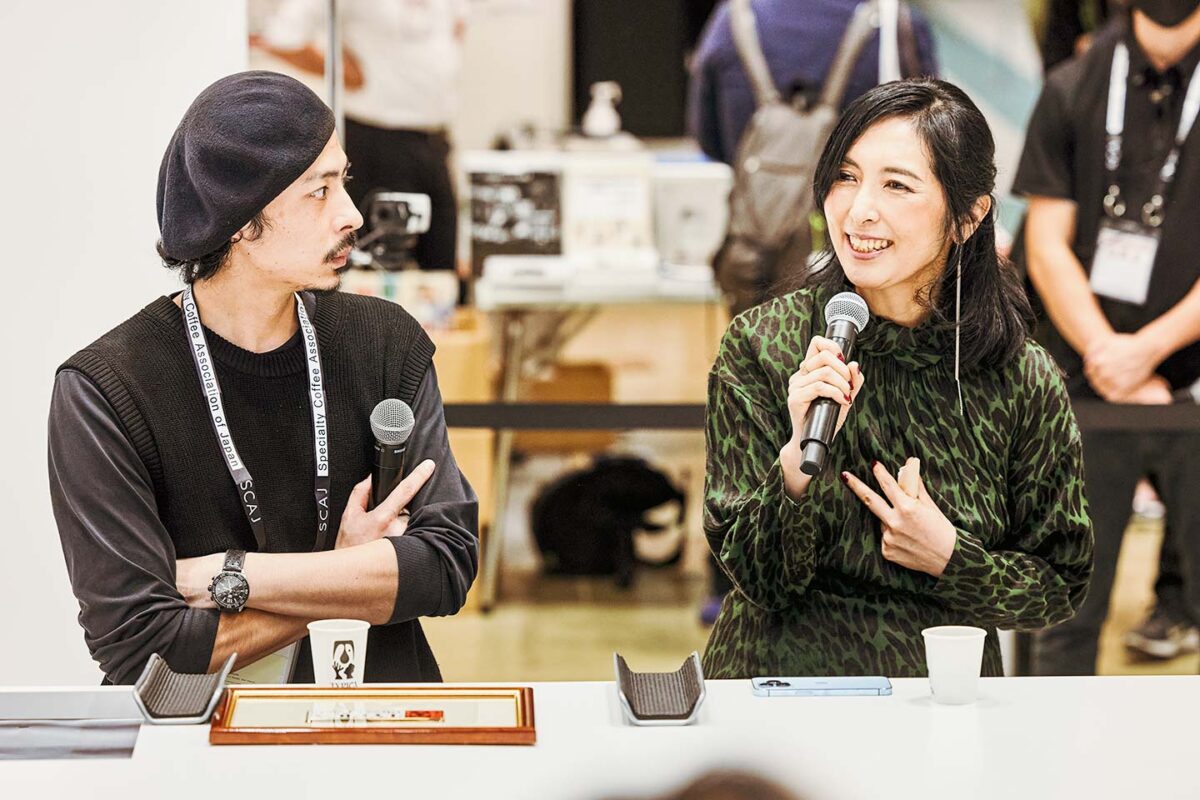
Making stories resonate
Masashi: At TYPICA, we think of coffee not only as a drink, but as a medium for telling a story. That’s behind our commitment to work with the producers and the roasters to get the message out there.
As a reporter, “getting the message out there” is something you’re more than familiar with, Chizuru. What advice would you give to Yuya, in using coffee as a medium to tell a bigger story?
Chizuru: That’s a difficult question to answer. Creators feel very strongly about their creation, they pour their heart and everything they’ve got into making it great. But there’s a big difference between getting a message across, and having that message land. The key to doing that, I think, is to try and understand coffee drinkers, focus on making the people right in front of you happy. If you do that, and you do it with passion, then people will not only listen to your story, but resonate with it. Yuya’s presentation was the perfect example of how to do that well and I hope that, no matter how successful he becomes, he doesn’t forget what’s important.
Masashi: So what you’re saying is, focus less on trying to make coffee drinkers understand what we’re about, and more on giving people great experiences with coffee. Thanks, Chizuru, that’s great advice.
Finally, before we end today, I’d like to hear a few words from Mao Fujihara, the community manager who is the project lead for the TYPICA GUIDE.
Mao Fujihara (Mao): The TYPICA GUIDE basically came from wanting to help people discover delicious coffee. You know, when your friend says they don’t like light roasts because of the sour aftertaste, and you think, no, you’re wrong, you just need to find the right roaster. Well, the TYPICA GUIDE does that.
Anyway, because I was working on that, I got to see all of these amazing presentations from roasters, sharing their incredible passion for coffee and what they do. And working on that project night after night, at times the presentations were so heartfelt they moved me to tears.
So watching everyone’s presentations today was quite an emotional experience for me. While I managed to hold back the tears, it was still an epic moment. It’s inspired me even more to put everything we’ve got into making this project a service that can support roasters in the best way possible.
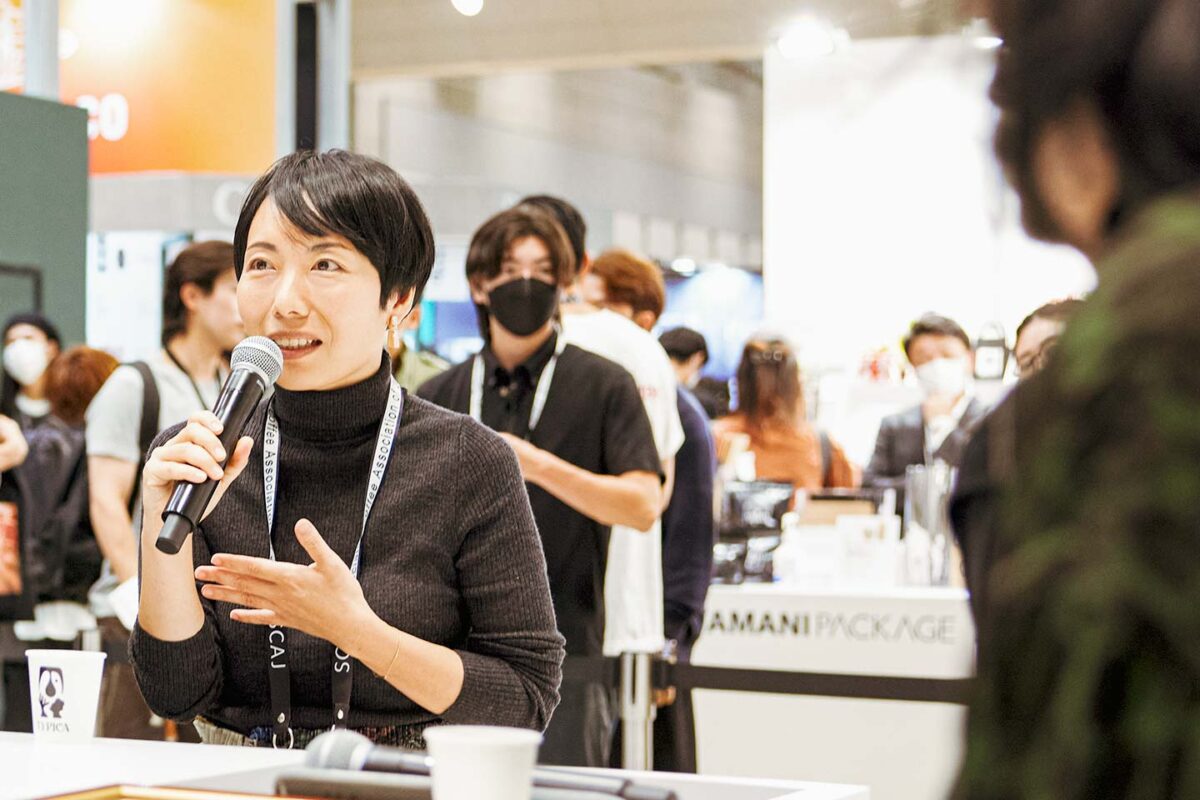
Masashi: Thank you, Mao. Ayane, anything to add?
Ayane: Going back to what Chizuru said about the difference between telling and resonating, I think specialty coffee has this image of being very complicated, and it’s hard to express how direct trade gives back to the producers. In the end, most consumers make choices based on what tastes good. It’s the same with fashion: Consumers generally choose clothes by their design.
But when you see someone like Yuya doing a presentation, you can see how roasters are also a key to storytelling. Anyone watching Yuya today will want to hear what he has to say, they’ll go to his shop to hear more and that’s a chance to tell these stories and have them land in a natural, authentic way. One way to have more roasters do this is the It’s a New Wave project, and I’m looking forward to seeing how that will progress, and seeing more of Yuya in this space in the future.
Yuya: Thank you.
Masashi: The TYPICA GUIDE was launched in Japan today, and will soon be launched in South Korea, Taiwan, and then Europe. I’m incredibly grateful that I got to announce the launch here, in front of all of you, and I want you to know we’ll keep on working to cultivate a future we can all be proud of. Thank you!